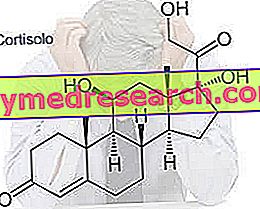By Dr. Nicola Sacchi - Author of the book: Drugs and doping in sport -
Cortisol is also called the stress hormone, as it is produced by the body under stress conditions, recognized by the body as a disorder of homeostasis (cellular balance with the environment). Any event capable of disturbing cellular or organic homeostasis is considered by the body as a stressing agent.

As previously mentioned, cortisol is secreted to a greater extent when a subject is subjected to a situation of chronic stress, therefore, there are many factors that can promote the release of this hormone; knowing them and avoiding these situations allows an individual to stay more healthy.
It is known how people subjected to stressful situations tend to gain weight, to have little energy, to lose muscle mass, to have sleep disorders, to retain fluids. These are all effects created by the increase in cortisol.
To better control the production of this hormone, a person can take numerous precautions in his own style of life:
Rest :
- Sleeping at least 8 hours, lack of rest is a condition of great stress
- Do not reverse the daytime cycles, so going to bed at night and waking up early in the morning, the biological rhythms are marked by light, reversing them alters the production of glucocorticoids
- If possible, take a 30-minute rest in the early afternoon.
Supply:
- Make small, frequent meals, possibly eat every 3 hours, to avoid hypoglycemia, which in turn causes cortisol release
- Take carbohydrates with a low glycemic index at least 2/3 times a day to avoid hypoglycemia and / or insulin spikes with secondary hypoglycemia, resulting from the excessive release of insulin which consequently stimulates the cells to absorb glucose
- Take carbohydrates after training, as intense physical activity consumes sugars and leads to hypoglycemia, which stimulates the release of glucocorticoids
- Having breakfast with just awake carbohydrates, after fasting at night, the body must re-stabilize the blood sugar level that goes down into the night
- Do not fast, as food deprivation leads to hypoglycemia, as well as catabolizing muscle mass
- Take fruits and vegetables and possibly an antioxidant complex, as free radicals can damage cells and trigger inflammatory states that cause cortisol release
- Eat fatty fish or take omega-3 supplements as an imbalance between omega-3 and omega-6 fats leads to the development of chronic inflammation that promotes cortisol release
- Drink 2 liters of water a day: in addition to favoring the elimination of toxins, possible states of dehydration are avoided, a very stressful condition for the body
- Sip water during and after a workout for the same reason as above.
Work out:
- Avoid long workouts, as the release of glucocorticoids is proportional to the duration of physical activity
- Keep a day of rest after an intense workout, as the muscle microtraumas induced by the training activate an inflammatory response which, if excessive, causes cortisol release, so training a body that is still tired from the previous workout can promote the release of cortisol
Good habits:
- Don't neglect the diseases since any pathology favors the release of glucocorticoids
- Reduce the hectic pace that can stress the body
- Try to reduce states of anxiety and excessive agitation
- Avoid using drugs and alcohol
Protect yourself from the elements:
- Avoid extreme climates, or at least cover yourself when it's cold and look for cool places on sultry days.
- Protect yourself from the sun, as excessive exposure to sunlight damages the skin, overheats the body and activates an inflammatory response.
These indications improve life and reduce cortisol production, thus promoting health, well-being, weight loss, fitness and full fitness.



